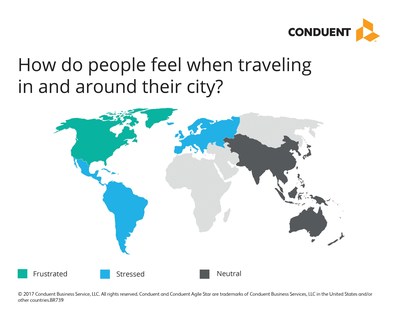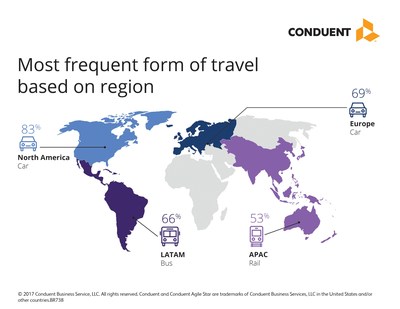FLORHAM PARK, N.J., May 24, 2017 /PRNewswire/ -- Traffic and congestion remain a major focus issue for cities worldwide. While new technologies, updated infrastructure and expanded mobility choices are surfacing to ease the hassle of traveling within urban areas, the biggest factor in improving urban travel is changing human behavior. This is according to Conduent's (NYSE: CNDT) Customer Experience of Urban Travel report – an extensive survey of mobility trends and preferences conducted in 23 cities across 15 countries.
"Transportation is an inherently personal decision. People primarily focus on their individual situation, factoring in speed, comfort and cost when determining how they'd like to travel," said Don Hubicki, executive vice president, Conduent, Public Sector, Transportation. "Providing more choices in line with our personal situations is key to changing behavior. For example, cities should introduce more options for getting around, incentivize people to choose alternatives, and provide innovative apps that enable people to think mode-agnostically, making better decisions for themselves and everyone else."
Transportation Choice Isn't Rational
- Respondents around the globe chose "driving their own car" over other modes of transport for reasons including comfort (54 percent), ease of access (47 percent) and reliability (39 percent).
- However, driving is the mode of transportation cited most as involving frequent delays when travelling in and around the city1. Respondents experiencing delays at least one day a week shared that delays cause them to miss out on time with their family and friends (61 percent sometimes/frequently) or arrive late to work (51 percent sometimes/frequently).
- Furthermore, delays may be a large contributor to stress and frustration. Nearly 40 percent of all respondents reported the negative emotions of 'stressed' (23 percent) or 'frustrated' (16 percent) to describe how travel in and around their city makes them feel.
Despite this experience with delays, people still choose to drive, signaling that transportation decisions are influenced heavily by habits, convenience and personal preferences influenced by factors such as infrastructure, culture and demographics.
Enabling Multimodal Travel
"People's preferred travel choices aren't always best for their communities. It's time to think beyond transportation silos and present alternative options to create a better, more seamless travel experience," said Hubicki. "Despite an over-reliance on cars, our survey shows more than half of respondents find the proposition of a multimodal experience appealing."
- Multimodal systems allow commuters to use more than one mode of transportation per journey. For example, someone might choose to ride a bus to the nearest train station, then take the train to their destination. This system provides greater travel flexibility and helps solve the "first-mile, last-mile" problem.
- Making a multimodal system a reality requires urban planners to look for levers that can drive change, such as speed and reliability of services, education and information. Respondents rated reliability of services (83 percent) and information (81 percent) as fairly or very important for future travel. In addition, nearly three-quarters of respondents (70 percent) said they'd likely be encouraged to ride public transit more frequently if the journey time was faster.
Transportation Innovation is Key
Another step cities can take to show progress toward delivering an innovative solution that eases travel woes is to roll out travel apps showing all available modes and routes for commuters to reach their destination.
- Nearly half (49 percent) of all respondents believe they will have one app for their transportation needs by 2020. Conduent debuted its own unique mobility apps in 2016 integrated into the core of Transit and Parking Systems. Pilot program versions of these mobility apps are currently in use in Los Angeles, Denver, Centennial, Colo. and Bengaluru, India.
- Additionally, Syndicat Mixte Intermodal Regional de Transports (SMIRT), a grouping of transport authorities in northern France, has become the first to deploy the Conduent Mobility Companion Platform to modernize the passenger experience with door-to-door multimodal trip planning.
"The future of transportation is a combination of what's possible and what's needed," said Hubicki. "People often don't know there's a better way, so when they imagine the future, they're limited by their current experiences and perceptions of travel. There is an opportunity to educate and show the way forward."
Conduent is a leading provider of public transportation and mobility solutions – including Electronic Toll Collection, Transit and Public Transport, Parking and Safety – which offer automated, analytics-based, personalized services for government agencies and their constituents. The company has been helping transportation clients in more than 27 countries for over 40 years.
About Conduent
Conduent is the world's largest provider of diversified business process services with leading capabilities in transaction processing, automation and analytics. The company's global workforce is dedicated to helping its large and diverse client base deliver quality services to the people they serve. These clients include 76 of the Fortune 100 companies and over 500 government entities.
Conduent's differentiated offerings touch millions of lives every day, including two-thirds of all insured patients in the U.S. and nearly nine million people who travel through toll systems daily. Whether it's digital payments, claims processing, benefit administration, automated tolling, customer care or distributed learning – Conduent manages and modernizes these interactions to create value for both its clients and their constituents. Learn more at www.conduent.com.
About the Survey
An online survey was conducted amongst 18-65 year olds who hold a driver's license. A final sample size of n=2320 was achieved across 23 cities between September 6 and September 22, 2016. Those cities were: London, Melbourne, Sydney, Singapore City, Austin, Los Angeles, New York, Philadelphia, Portland, San Francisco, Washington DC, Kuala Lumpur, Amsterdam, Milan, Paris, Madrid, Brussels, Montréal, Toronto, México City, Santiago, Lima and Frankfurt.
Note: Conduent is a trademark of Conduent Incorporated in the United States and/or other countries.
1 According to our survey respondents, 10 percent of those who drive at least one day a week say they experience delays on 6-7 days.
SOURCE Conduent Incorporated
Related Links
WANT YOUR COMPANY'S NEWS FEATURED ON PRNEWSWIRE.COM?
Newsrooms &
Influencers
Digital Media
Outlets
Journalists
Opted In


Share this article